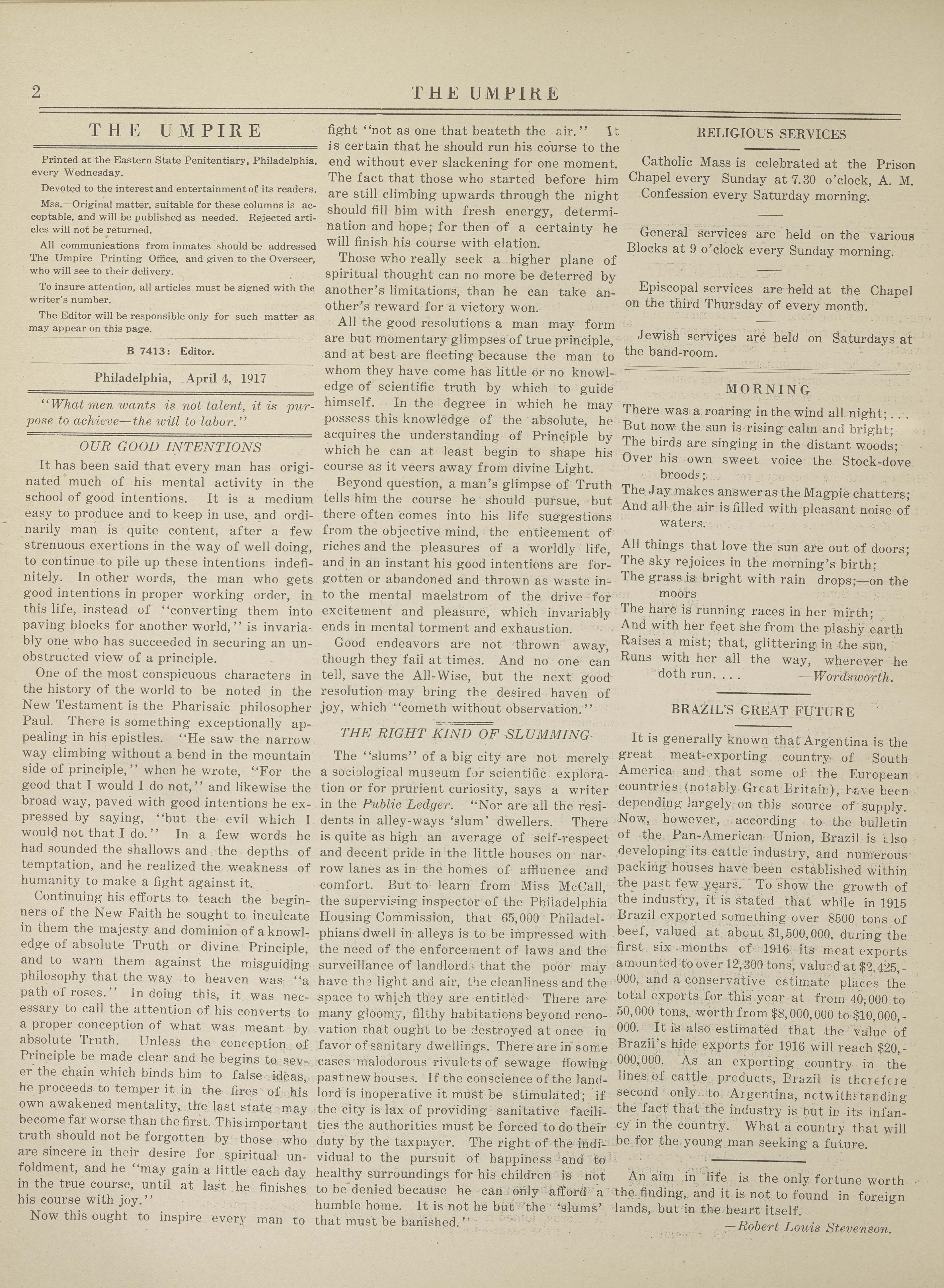Devoted to the Interests and Entertainment of its Readers
Printing in Prisons
Designed in Memory of Incarcerated Printers & Typesetters
Established 2023
Our Good Intentions
- Author: Unknown
- Editor: B-7413
- Newspaper: The Umpire volume 6
- Page Number:
- Date: 4 4 1917
- Tags:
OUR GOOD INTENTIONS It has been said that every man has originated much of his mental activity in the school of good intentions. It is a medium easy to produce and to keep in use, and ordinarily man is quite content, after a few strenuous exertions in the way of well doing, to continue to pile up these intentions indefinitely. In other words, the man who gets good intentions in proper working order, in this life, instead of "converting them into paving blocks for another world," is invariably one who has succeeded in securing an unobstructed view of a principle. One of the most conspicuous characters in the history of the world to be noted in the New Testament is the Pharisaic philosopher Paul. There is something exceptionally appealing in his epistles. "He saw the narrow way climbing without a bend in the mountain side of principle," when he wrote, ‘For the good that I would I do not," and likewise the broad way, paved with good intentions he expressed by saying, "but the evil which I would not that I do." In a few words he had sounded the shallows and the depths of temptation, and he realized the weakness of humanity to make a fight against it. Continuing his efforts to teach the beginners of the New Faith he sought to inculcate in them the majesty and dominion of a knowledge of absolute Truth or divine Principle, and to warn them against the misguiding philosophy that the way to heaven was "a path of roses." In doing this, it was necessary to call the attention of his converts to a proper conception of what was meant by absolute Truth. Unless the conception. of Principle be made clear and he begins to sever the chain which binds him to false ideas, he proceeds to temper it in the fires of his own awakened mentality, the last state may become far worse than the first. This important truth should not be forgotten by those who are sincere in their desire for spiritual unfoldment, and he "may gain a little each day in the true course, until at last he finishes his course with joy." Now this ought to inspire every man to fight "not as one that beateth the air." It is certain that he should run his course to the end without ever slackening for one moment. The fact that those who started before him are still climbing upwards through the night should fill him with fresh energy, determination and hope; for then of a certainty he will finish his course with elation. Those who really seek a higher plane of spiritual thought can no more be deterred by another's limitations, than he can take another's reward for a victory won. All the good resolutions a man may form are but momentary glimpses of true principle, and at best are fleeting because the man to whom they have come has little or no knowledge of scientific truth by which to guide himself. In the degree in which he may possess this knowledge of the absolute, he acquires the understanding of Principle by which he can at least begin to shape his course as it veers away from divine Light. Beyond question, a man's glimpse of Truth tells him the course he should pursue, but there often comes into his life suggestions from the objective mind, the enticement of riches and the pleasures of a worldly life, and in an instant his good intentions are forgotten or abandoned and thrown as waste into the mental maelstrom of the drive for excitement and pleasure, which invariably ends in mental torment and exhaustion. Good endeavors are not thrown away, though they faii at times. And no one can tell, save the All-Wise, but the next good resolution may bring the desired haven of joy, which "cometh without observation."

